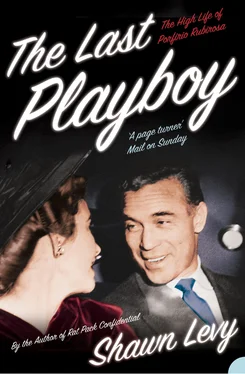Perhaps the scandal she’d created with her outburst was too great; perhaps Ana feared in time of civil war for the safety of her children (“Careful Pedro, careful! He’s so little!”); perhaps Don Pedro, in his mid-thirties, had grown too comfortable, too encumbered, too secure to lead troops; perhaps his intellect was recognized by his colleagues as more useful to them than his bravery; perhaps he was in flight from enemies. For whatever reason, in 1914, soon after Doña Ana’s bold gambit, the Rubirosas found themselves sailing away from their bellicose, agitated little country. Don Pedro had been named to serve in the Dominican legation in St. Thomas, the Virgin Islands.
At the age of five, Porfirio Rubirosa had begun his lifetime of wandering.
TWO
CONTINENTAL SEASONING
In a one-room schoolhouse—a large hut, really—the teacher bent down to address his new pupil, who spoke neither French nor English, and handed him a small violin. It was time for the school orchestra to practice, and everyone took part.
But this slim little boy didn’t know how to play. He took his instrument and dutifully joined his classmates, who included his older brother and sister. He stood in the back. The others, following the teacher’s directions, began to saw away at their music. The boy began to cry.
The teacher spoke to him kindly: “Act as if you can play, that’s enough.”
And the child, mollified, did just that.
And he thought to himself, “Is the world of grown-ups, perhaps, a world in which appearances are all that matters?”
St. Thomas, where Porfirio Rubirosa learned how not to play the violin, was an Antillean idyll for Don Pedro’s family. For less than a year they lived in a small house in the middle of a sugarcane plantation while Don Pedro saw to his ministerial duties. Back home, the situation was still dangerously unstable: Haiti too had fallen into turmoil, and the United States, to which the Dominican treasury owed a sum it couldn’t possibly repay, had taken a more active interest in the rising chaos on the island. Fewer than twenty years earlier the Yankees had driven Spain out of Cuba; now events in Europe—where a continent-wide war had been set off—made the securing of the Caribbean a matter of increasing import in their eyes.
From St. Thomas it was impossible for Don Pedro to read the subtleties of the power struggle back home. So he chose, in a sense, to turn away from it. In 1915, he accepted another diplomatic appointment, one that would have an indelible impact on himself and his family. He would represent his country at its embassy in France.
This new charge meant more than just uprooting his wife and children. Don Pedro was being sent to the most prestigious posting in the world by a government he couldn’t be sure would exist from week to week and at a time when his new home was itself embroiled in war. Even as he could anticipate with zest a new life in Europe, the onetime warrior of the Cibao sobered at the weight of the prospect. And Porfirio, sensitized by his musical experience to the language of appearances in the adult world, noticed the metamorphosis. “My father had changed,” he recalled later. “No longer did he wear a pistol in his belt or a saber between his shoulder blades. He was now Chief of a diplomatic mission.”
And not just any diplomatic mission, of course, but Paris—the capital of the world insofar as it had one. “We have perhaps forgotten,” Don Pedro’s son would write, “that before the war of 1914, the prestige of France throughout Latin America was immense. From the other side of the Atlantic, France seemed the ideal marriage of the style of the ancien régime with the dynamism of revolution.”
Getting there was a fantastic adventure. The family sailed on the Antonio Lopez to Gibraltar, where they were greeted not with flags and salutes but with gunfire; British authorities suspected that among the ship’s passengers was a German spy disguised in frock and wig. Again the young boy’s imagination was fired by the strange simulations of the grown-up world: “The mustached warriors of the Caribbean had been succeeded by Europe and spies dressed as women!” After a search, the Antonio Lopez was permitted to disgorge its passengers. The Rubirosas headed north by train. Ana and Cesar were left in Barcelona, the nearest important Spanish-speaking city to Paris, to continue their schooling. Porfirio continued on with his parents.
The city to which Don Pedro had been posted was a wonder to his son. There were strange new creature comforts, like the kidskin coat he wore as a redoubt to the astonishing cold. There were the impressive signs of war: cannons encircling the Arc de Triomphe, soldiers in the streets and the cafés. And there were glamorous sensations of the sort never seen in San Francisco de Macorís. On the first full day the family spent in the city, Don Pedro took his son to a cinema, where the boy sat in awe watching the great star Pearl White in The Mysteries of New York , a movie serial filled with barbaric cruelties, thrilling chases, impossible situations miraculously escaped from, and a fiendish villain, the Clutching Hand, who preyed on the beautiful heroine for occult reasons only he fathomed. One image would linger in the youngster’s mind for decades: Pearl White trapped in a tube that slowly filled with water, threatening to drown her.
The family made its home first in temporary quarters on Boulevard Saint Germain and then within shouting distance of the Arc de Triomphe at 6 Avenue Mac-Mahon, an address that would exert a nostalgic pull on Porfirio throughout the decades in which he would live in Paris. The house sat in the true symbolic center of the city, which perhaps accounted for the number of times the Rubirosas found themselves collaterally involved in aerial bombardment by German planes, which regularly cut through the sky, flaunting their black-and-white crosses. Most French families fled underground at the sound of enemy aircraft, but Don Pedro reasoned that this would be a terrible hideaway, a lair of death by crushing or suffocation or slow starvation. Rather, he insisted that they stay above stairs, where they endured the occasional air raids and the accompanying thunder of bombs with stoicism the English would have admired: Don Pedro reading his newspaper, Porfirio playing with toys, Doña Ana saying her rosary. Only after the house suffered a truly astonishing concussion one afternoon when a bomb hit the nearby Avenue de la Grande Armée did the brave tíguere rethink his policy and direct his family to belowgrounds safety.
These close calls exerted an accumulative toll, and the Rubirosas soon moved to the coastal city of Royan, less than two hundred miles north of Spain on the Atlantic coast. There, Cesar and Ana rejoined the family and Don Pedro received some shocking news: The civil war back home had so escalated that marines from the United States had occupied the Dominican Republic.
Don Pedro had foreseen as much, according to Porfirio. “My father,” he remembered, “realized that this constant civil war would only lead to catastrophe—the loss of national independence or dictatorship.” But preparing for such a blow didn’t lessen its impact, turning Don Pedro permanently from a man of action into a man of words, ideas, and policies. “Suddenly,” Porfirio noted, “with the decisiveness that characterized him, he changed into a quiet man and began to study, with the help of a professor who came to the house, the worlds of economics, politics, international relations and languages.” He was particularly taken with the law, and built a small library in his house of the imposing legal volumes published by Dalloz. It was, in his son’s eyes, a poignant metamorphosis: “In my childhood, I never saw my father without a Smith and Wesson at his side; in my adolescence, in turn, I never saw him without a Dalloz under his arm.”
Читать дальше












